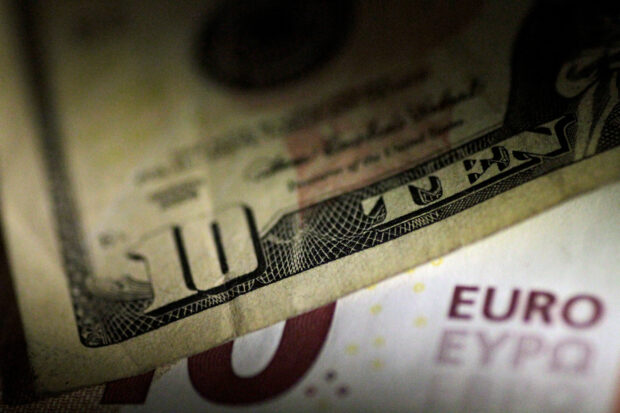Dollar hits 5-month low against euro as Fed seen closer to rate cuts

U.S. Dollar and Euro notes are seen in this June 22, 2017 illustration photo. REUTERS/Thomas White/Illustration
NEW YORK -The dollar slipped to a five-month low against the euro and a basket of currencies on Wednesday on expectations the Federal Reserve could soon cut U.S. interest rates.
But with many traders out for holidays volumes are likely to remain muted until the New Year, and price moves are exaggerated by low liquidity.
The dollar index, which measures the U.S. currency against six others, fell 0.48 percent to 100.98, the lowest since July 27. The index is on course for a 2.45-percent drop in 2023 after two years of strong gains driven by the anticipation of interest rate hikes by the Fed followed by its actual rate increases to battle inflation.
The Fed is now viewed as being dovish relative to other major central banks. Pricing for a rate cut in March increased after Fed Chairman Jerome Powell was unexpectedly dovish at the U.S. central bank’s December meeting, when policymakers projected 75 basis points in easing in 2024.
READ: With rate hikes likely done, Fed turns to timing of cuts
Other central banks including the European Central Bank (ECB) have maintained a higher for longer stance. The Bank of Japan, meanwhile, has indicated that it is closer to ending its negative rate policy even as it also maintains it is in no rush to make a change.
“Japan is going to finally come off of their extreme low policy within the next couple of months at least and also the ECB is sounding a little more hawkish than the Fed‘s newfound dovishness,” said Lou Brien, market strategist at DRW Trading in Chicago.
Key to the U.S. outlook will be what prompts rate cuts. If inflation falls much faster than the Fed‘s benchmark rate it can tighten monetary conditions more than Fed policymakers intend.
READ: Fed stands alone as ECB, BoE stick with tight policy
“If the Fed cuts rates because inflation has come so far down that they don’t want policy to unintentionally tighten … then that’s probably a good scenario,” said Brien.
If they cut because of a weakening economy, however, “then the history is kind of harsh” for the economy and the stock market, he added. “The motivation behind the rate cuts is still unknown and is going to be the most important factor.”
The euro rose 0.54 percent to $1.1102, the highest since July 27. The single currency is on track to gain 3.61 percent this year.
Sterling rose 0.56 percent to $1.2793, and earlier reached $1.2802, the highest since Aug. 10. The British currency is headed for a 5.79-percent return this year.
The dollar fell 0.35 percent to 141.89 Japanese yen, but is headed for an 8.22 percent gain this year.
The Bank of Japan said on Wednesday it would reduce the amount of bonds it buys in its regular operations in the January-March quarter.
A summary of opinions at the Bank of Japan’s Dec. 18-19 meeting also showed BOJ policymakers saw the need to maintain policy for now, with some calling for a deeper debate on a future exit from massive stimulus.
The Australian and New Zealand dollars both touched more than five-month peaks earlier in the session. The Aussie was last up 0.21 percent at $0.6841, while the kiwi gained 0.10 percent at $0.6335.
Bitcoin rose 1.6 percent to $43,191.